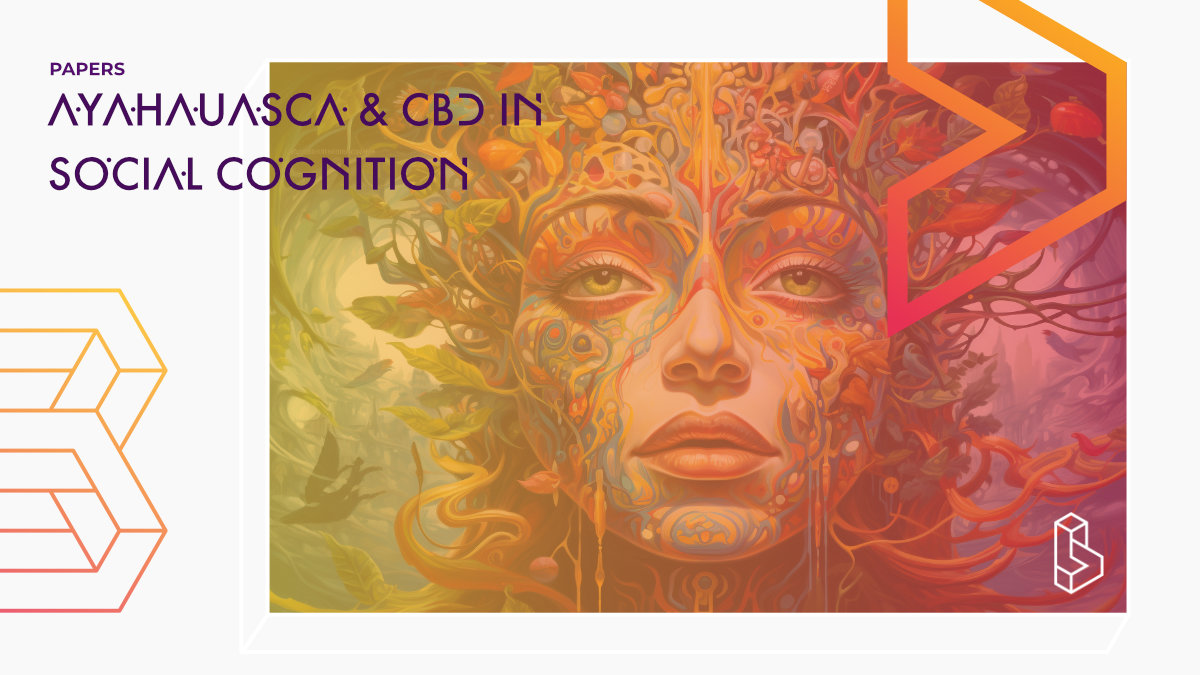This parallel-arm, randomized controlled trial (n=17) examined the effects of cannabidiol (CBD) on the recognition of emotions in facial expressions (REFE) and empathy following the consumption of ayahuasca in healthy volunteers over 18 months. The participants received either a placebo or 600 mg of CBD, followed by oral ayahuasca (70ml/70kg) 90 minutes later. Results showed significant reductions in both groups’ reaction times and anxiety, sedation, cognitive deterioration, and discomfort, but no differences were observed.
Abstract of Ayahauasca & CBD in Social Cognition
“Background: Serotonergic hallucinogens and cannabinoids may alter the recognition of emotions in facial expressions (REFE). Cannabidiol (CBD) attenuates the psychoactive effects of the cannabinoid-1 agonist tetrahydrocannabinol. Ayahuasca is a dimethyltryptamine-containing hallucinogenic decoction. It is unknown if CBD may moderate and attenuate the effects of ayahuasca on REFE.
Procedures: Seventeen healthy volunteers participated in a 1-week preliminary parallel-arm, randomized controlled trial for 18 months. Volunteers received a placebo or 600 mg of oral CBD followed by oral ayahuasca (1 mL/kg) 90 minutes later. Primary outcomes included REFE and empathy tasks (coprimary outcome). Tasks were performed at baseline and 6.5 hours, 1 and 7 days after the interventions. Secondary outcome measures included subjective effects, tolerability, and biochemical assessments.
Results: Significant reductions (all P values <0.05) only in reaction times were observed in the 2 tasks in both groups, without between-group differences. Furthermore, significant reductions in anxiety, sedation, cognitive deterioration, and discomfort were observed in both groups, without between-group differences. Ayahuasca, with or without CBD, was well tolerated, producing mainly nausea and gastrointestinal discomfort. No clinically significant effects were observed on cardiovascular measurements and liver enzymes.
Conclusions: There was no evidence of interactive effects between ayahuasca and CBD. The safety of separate and concomitant drug intake suggests that both drugs could be applied to clinical populations with anxiety disorders and in further trials with larger samples to confirm findings.”
Authors: Giordano N. Rossi, Juliana M. Rocha, Flávia L. Osório, José C. Bouso, Genis Ona, Gabriela de Oliveira Silveira, Mauricio Yonamine, Giuliana Bertozi, Eduardo J. Crevelin, Maria E. Queiroz, José A. S. Crippa, Jaime E. C. Hallak & Rafael G. Dos Santos
Summary of Ayahauasca & CBD in Social Cognition
Social cognition involves several aspects of how humans interact with each other, and some aspects are altered detrimentally in patients with mood disorders. However, some treatments improve social cognition before improving subjective perception of symptom amelioration.
Psychedelics are agonists of the serotonin 5-HT1A/2A/2C receptors and thus are also known as serotoninergic hallucinogens. They are currently being researched for the treatment of depression and anxiety and substance use disorders.
Find this paper
https://doi.org/10.1097/JCP.0000000000001691
Paywall | Google Scholar | Backup | 🕊
Cite this paper (APA)
Rossi, G. N., Rocha, J. M., Osório, F. L., Bouso, J. C., Ona, G., de Oliveira Silveira, G., ... & Dos Santos, R. G. (2022). Interactive Effects of Ayahuasca and Cannabidiol in Social Cognition in Healthy Volunteers: A Pilot, Proof-of-Concept, Feasibility, Randomized-Controlled Trial. Journal of Clinical Psychopharmacology, 10-1097.
Institutes
Institutes associated with this publication
University of São PauloThe University of São Paulo has been conducting research with psychedelics for many years, with a focus on ayahuasca given its traditional use in Brazil.
Compound Details
The psychedelics given at which dose and how many times
Ayahuasca 70 g | 1x
